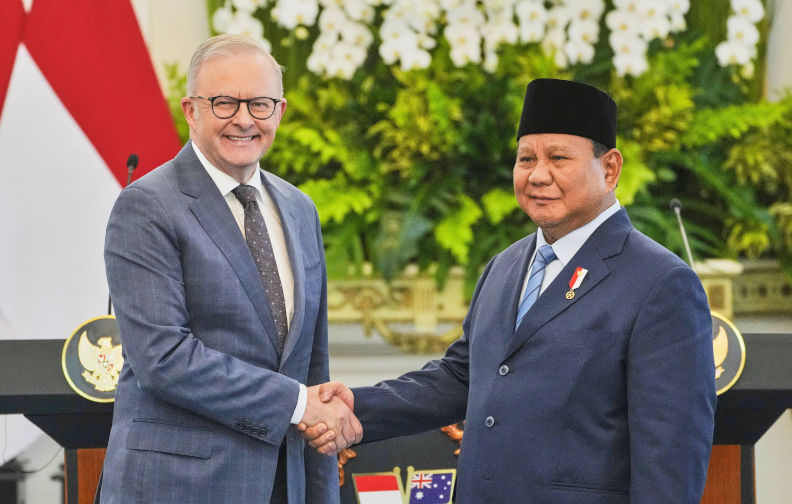Once Australia was important to Indonesia
August 6, 2025
Happy birthday, monster neighbour. Er, do we know you? We’re strangers here – our proper place is mid-Atlantic, ‘twixt the Old World and the New. However, we’re trying hard to cope by promoting trade and investment, while ignoring endemic _corruption_ and avoiding deep involvement.
This month, Indonesia celebrates the 80th anniversary of Proklamasi (the proclamation of independence) after more than three centuries as the Dutch East Indies, colloquially Tujuhbelasan (the 17th).
The unofficial protocol has a fresh PM making his first overseas visit to the Republic because, as Paul Keating said last century, “No country is more important to Australia than Indonesia.”
Anthony Albanese upheld the tradition a dozen days after his election in May with a one-day dash to Jakarta. President Prabowo Subianto, who was inaugurated last October, has yet to reciprocate.
Australia was once important to Indonesia; that was when Ozzie unionists helped with the liberation. It’s a great yarn, though little known now.
In 1943, about 500 Indonesian political prisoners were secretly shipped to Australia to be re-interned; Canberra supported the Dutch colonialists.
A note from a prisoner tossed from a train reached a rail worker at Liverpool who could read Indonesian. Activists traced the men to nearby PoW camps. Unions campaigned for their release and blocked ships trying to service the return of the colonialists.
Former Australian ambassador to Indonesia, Gary Quinlan, once told foreign journalists:
“When the first military offensive against the independent Republic (by the Dutch who ignored the proclamation) was launched in July 1947, Australia complained to the new UN Security Council…
“President Soekarno chose Australia to represent Indonesia in these UN discussions, which ultimately led to independence on 27 December 1949. Australia formally recognised Indonesian independent statehood that day and formally sponsored Indonesian membership of the UN.”
The nation that’s remembering its guerrilla-action triumphs (Australian historian Dr Frank Palmos called the Battle of Surabaya “Indonesia’s Gallipoli”) has forgotten its antipodean diplomatic roots.
To wander the world’s largest archipelago last century was to collect handshakes by declaring: “I’m Australian,” as opposed to being Belanda (Dutch).
Now that is rare. Apart from toddlers staring at white skin, funny clothes and fat guts, our presence draws little reaction apart from shopkeepers doubling the price. Curiosity has yielded to coolness. Hello has become ho-hum, yet the deep differences remain.
Melbourne Uni academics Tim Lindsey and Dave McRae have put it well:
“There are no two neighbouring countries anywhere in the world that are more different than Indonesia and Australia. They differ hugely in religion, language, culture, history, geography, race, economics, worldview and population (Indonesia, 285 million, Australia less than 10% of that).
“Indonesia and Australia have almost nothing in common other than the accident of geographic proximity. This makes their relationship turbulent, volatile and often unpredictable.”
Particularly now that Prabowo is trying to emulate tough-guy Trump, which he can do with clout as a disgraced former general, by militarising his nation’s civil agencies.
Leading to 17 August, the Republic is going bananas with buntings and banners, flags and ribbons, red and white, draping everything upright, even smothering the fag ads that dominate the streetscape. Like it or not, we all fly a flag at the gatepost.
No worries that speed limits and other road signs get covered – even when clear, they’re ignored.
All verses of Indonesia Merdeka (freedom) are known, so no subtle coughing when the national anthem is played, often masking calls to prayer from mosque towers and the roar of motorbikes.
Then, it seems, secular patriotism trumps religious fervour in the world’s most populous Islamic nation – though not a theocracy.
We send almost 1.5 million tourists every year to Indonesia, mainly Hindu Bali. They return with melanoma spots, tattoos, braids and a couple of words – Bintang (star and a beer brand), bagus (good) and a booking for next year.
Few venture into Muslim Java, though it’s just a 30-minute ferry ride and a different universe.
Most visitors know the names of US politicians and what they’re doing, though not their Indonesian counterparts. Why should they? The Australian media rarely reports on the world’s third-largest democracy, even though the principle is under threat.
The exception is when a volcano blows or an uninsured Okker prangs a rental.
Some of the Oz teens flaunting their new bodies on Kuta beach may have briefly encountered junior high classes in Indonesian language and culture, but failed to follow into uni because courses have closed.
If only slogans about importance were taken seriously.
Indonesian public schools teach a little English, but concentrate on grammar. There are more pressing responsibilities; students in well-ironed uniforms are rehearsing for parades and flag raisings – all spectacularly choreographed though the goose-steps worry pacifists.
Equally sinister is the still-coming revision of history that has been discussed in this column and could become divisive, though the claimed intent is to unify. To be discovered.
The fun starts after noon when the atmosphere becomes more country carnival with greasy-pole climbing, horse rides and roadside snacks.
Curiously, little attention is given to preserving the era. The house where Soekarno proclaimed independence from the veranda has been demolished. Other historical landmarks have vanished.
The best account of Indonesia’s idiosyncrasies is in Indonesia Etc – exploring the improbable nation by former Reuters journo-turned-epidemiologist Dr Elizabeth Pisani. The US/English adventurer travelled 20,000km across the archipelago, usually alone:
“I only had one rule: ‘Just say yes’. Because Indonesians are among the most hospitable people on earth.”
Her book’s title comes from the hurriedly shaped Declaration of Independence that’ll never challenge the prose of Thomas Jefferson:
We, the People of Indonesia, declare the independence of the Republic of Indonesia. The details of the transfer of power, etc., will be worked out as soon as possible.
Eighty years later, that’s still a work in progress. Maybe all will be fixed by the centenary.
The views expressed in this article may or may not reflect those of Pearls and Irritations.


